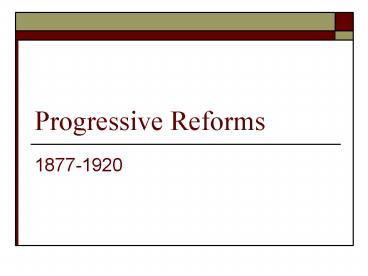Progressive Reforms - PowerPoint PPT Presentation
1 / 18
Title:
Progressive Reforms
Description:
... Cities which exposed corrupt machine politics in New York, Chicago, and ... The Oregon System this gave the people of Oregon more power and limited the ... – PowerPoint PPT presentation
Number of Views:23
Avg rating:3.0/5.0
Title: Progressive Reforms
1
Progressive Reforms
- 1877-1920
2
The Progressive Movement
- Many Americans called for reform in the 1800s.
Progressive reformers focused on urban problems,
government, and business. The focal point of
this movement was on political and economic
reforms.
3
Government Reforms
- Political Machines powerful organizations
linked to political parties that controlled local
government in many cities. They gained power by
attending to the needs of immigrants (e.g. jobs,
housing) - Controlled by political boss one of the most
famous was William Boss Tweed. He stole more
than 100 million from New York City. - Thomas Nast, a political cartoonist, often
criticized Tweed in his cartoons. He helped
bring Tweed to justice.
4
Spoils System
- Also known as patronage rewarding political
supporters with jobs and favors - In 1883 Congress passed the Pendleton Act, which
established the Civil Service Commission to end
the negative effects of the spoils system . - The Civil Service Commission set up competitive
exams for federal jobs.
5
Controlling Business
- During the late 1800s, many Americans came to
believe that trusts, or combinations of
companies, were becoming too large and powerful. - New laws were passed to regulate big business.
These were -
6
- In 1890 Congress passed the Sherman Antitrust
Act, the first federal law to control trusts and
monopolies. It also encouraged competition
amongst businesses. - In 1887 Congress passed the Interstate Commerce
Act which required railroads to charge
reasonable and just rates and to publish those
rates
7
The New Reformers
- In the early 1900s, new ideas for correcting
injustice and solving social problems emerged
among Americans. One of those ideas was
progressivism. - Progressives were alarmed by the concentration of
wealth and power in the hands of the few. They
supported government efforts to regulate industry.
8
- Journalists aided the reformers by exposing
injustices and corruption. These reporters were
called muckrakers. They exposed dangers in food,
drugs, and working conditions during the early
20th century. - Lincoln Steffens wrote Shame of the Cities
which exposed corrupt machine politics in New
York, Chicago, and other cities.
9
- Upton Sinclair author of The Jungle, which
described the horrors of the meatpacking industry
in Chicago - Ida Tarbell she described the unfair practices
of the oil trust. Her book The History of the
Standard Oil Company warned of the giant
corporations power.
10
Government Reforms
- The Oregon System this gave the people of
Oregon more power and limited the influence of
political parties. It consisted of the following - Initiative allowed citizens to introduce or
place a measure, law, or issue on the ballot in a
state election - Referendum gave voters the opportunity to
accept or reject laws that the state legislatures
enacted. - Recall enabled voters to remove unsatisfactory
elected officials from their jobs
11
- The 17th Amendment
- In 1912, Congress passed the 17th Amendment to
the Constitution to provide for the direct
election of senators. - Ratified in 1913, the amendment gave the people a
voice in selecting their representatives.
12
Womens Suffrage
- Women gained the right to vote with the passage
of the 19th Amendment. - Those who pushed for women to get that right
were known as suffragists. - One of the leading suffragists was Susan B.
Anthony.
13
Prohibition
- A crusade against alcohol began in New England
and the Midwest in the early 1800s. This
movement continued into the late 1800s and the
early 1900s as well. Known as the Temperance
Movement, it was supported by groups opposed to
the making and consuming alcohol.
14
- In 1917, Congress passed the 18th Amendment,
making it illegal to make, transport, or sell
alcohol in the U.S. - Also known as the Prohibition Law, it was
ratified in 1919.
15
(No Transcript)
16
Progressive Presidents
- Theodore Roosevelt
- Known as a trustbuster
- He promised the people a square deal fair and
equal treatment for all when he ran for president
in 1904. - He supported the Meat Inspection Act and the Pure
Food and Drug Act - Has been called Americas first environmental
president. He believed in the need for
conservation.
17
- William Howard Taft
- Succeeded Theodore Roosevelt
- Supported the 16th Amendment which gave Congress
the power to tax peoples income to generate
revenue for the federal government - Woodrow Wilson
- He supported the Federal Reserve Act which
regulates banks and banking - Wilson supported the Federal Trade Commission
which investigates corporations for unfair trade
practices
18
Struggle for Equal Opportunity
- Booker T. Washington
- believed equality for African Americans could be
achieved through vocational education and
accepted social separation - W.E.B. Du Bois
- Believed in full political, civil, and social
rights for African Americans. He thought African
Americans should seek immediate equality in all
areas.

